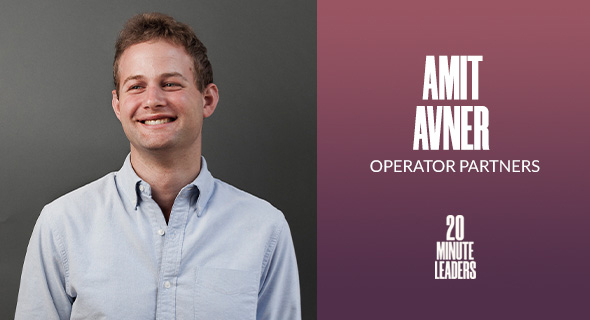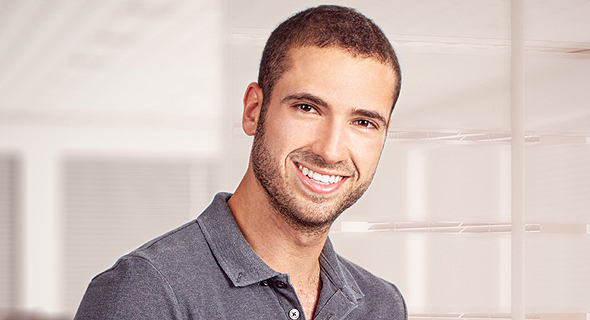“I think if you communicate well, everything else is solved.”
Talking to Michael Matias about his love for building, Amit Avner says the journey is really all about the people
Though he was drawn into his startup through his lifelong love for building, Amit Avner says the journey is really all about the people. He loved being able to hire amazing people to work with and having wonderful investors at Taykey. Building the culture of the company was fun, Avner recalls. Hiring the best people is one of the things he helps early-stage startups navigate in his current role as general partner at Operator Partners. A common issue he sees is startups not understanding which candidates will be good fits for the company culture. He and his partners give advice to founders in very casual relationships and are able to respond quickly to questions about all sorts of day to day decisions. Avner says they want to provide the kind of help they wished they could have gotten as young entrepreneurs.
Click Here For More 20MinuteLeaders
Take me back to your childhood. I see the engineering mindset that you bring to everything.
I think I was always building stuff. When I was in high school, I started building websites. I always viewed programming as just a fun thing. You have different blocks; you can create different things. In the IDF, I served in cyber. When I finished my Army service, it was the first time I joined social networks, and I noticed there's so much data out there. That's how Taykey ended up starting. There’s just a lot of cool data there, so let’s try to do something cool with it. It was the first time people were sharing a ton of personal data or thoughts. It became very easy, and there's become an abundance of data that can help create new products.
What was the vision at Taykey? Walk me through the most exciting things.
I love being an entrepreneur. The building is fun, and I do have to say that each one of the investors we had was amazing. For me, it's all about the people. It's about finding the people you want to work with and you want to be on a journey with. And every person that we had on this journey was just phenomenal and amazing. When we started, it was about the abundance of data on the web and trying to use it to figure out trends. The growth of the company was phenomenal; like within a year or two, I think we made a million dollars in revenue. For me, the best part about building a company was the people and building a fun culture. I think one of the things that drives me the most today is when I still meet people who used to work at Taykey. They tell me it's the best workplace they ever had and they miss Taykey days.
Was there a moment when building Taykey that you’re thinking, “I'm not sure what to do”? What do you do then?
I think that a dirty little secret about startups is that from the outside, everything looks amazing. You see the company is growing super-fast, it looks like it’s raising a lot of money, but when you're going inside, it’s a bunch of duct tape that's holding everything together. Imagine a wall with water coming in, and I think the game is trying to move fast enough to plug all the holes. New holes come up and then you plug them. I think those who win are those who keep plugging the holes fast enough before new holes come up. It's about moving fast, about trying, failing, trying again, failing, try again until you succeed, so that if you’re fast enough to observe problems, then you get good results, hopefully.

Then you turn from entrepreneur to investor but not a typical VC fund. What showed you this approach would provide value to early-stage startups?
At Operator Partners, we all have worked together for a long time, and we all invest in companies together and we just try to help out. Companies have similar problems in the sense of growth. It's about finding the right people, interviewing them, how to think about problems. The problems are unique for the company, but the way you're thinking and solving them is similar. We realized that we can bring a lot of value to a company and CEO by being advisors. We invest our money to become advisors at a company is kind of the way we're seeing it.
How do you work together with the entrepreneur?
In this model, we decided we don't want to compete with VCs. We work with a handful of VCs we really like and trust. We simplified the process by counting on their diligence. Once we do that, we meet a company, and when we invest in you, we say, “Here's our email, here's our WhatsApp. If you need anything, just come to us and we'll help.” It makes it super casual. We text the founders all day long. We make it what we wanted to have when we ran companies. It’s more about being in the loop and then things move really fast.
You're leaving the formality of the board meetings and very tangibly helping them with the day-to-day decisions that might not make it to the board meeting.
Correct. We're just trying to give the immediate, quick solve for problems from our experience, and all we bring is more of a crowdsource data of things we saw. We do have economies of scale in the sense of seeing so much stuff and repeating problems. Then you can also have connections with the network. If you come to us with a problem, we can say, “Oh, they had a similar problem; let's connect you two.” We want to be on the entrepreneur’s side.
What are some common decision-making points people need help on?
I think two interesting things: everyone has the hiring problem. Hiring great people is always hard, but it's also finding people who are a fit for you. I think it's something we do try to help people with. To try to understand their own culture and what’s going to be a fit. The other one is thinking about markets correctly. You want a great team in a giant market, but when there’s a really giant market, sometimes you want to make sure you focus.
Isn't there a part of you that wants to start another Taykey and go on this whole ride again?
Of course there is. But now I get to spend my week just meeting exciting entrepreneurs and talk about fun problems. I think the answer is that I’ll find the middle ground, like I will probably over time get involved in a few companies, maybe in a chairman role. I'll keep adapting. That's like an entrepreneur way of life, just keep changing into what you need at the right time.
What really gets you excited about Operator Partners?
It's just about having fun. I basically work with a bunch of my good friends. We get involved in some journeys we like, and it doesn't feel like work. I don't believe in working. Taykey never felt like work. I wake up in the morning, meet cool companies, talk to my friends, discuss these cool companies. Like, what could be better than that?
I don't know how you juggle 65 investments, especially on WhatsApp. But I love the idea of a casual, day to day model.
Once you have a bunch of people in the fund, and we each deal with different companies at different times based on their needs because we all have different expertise, it's very easy. I think each one of our companies would tell you how much we've been helpful, and that's important for me, getting a good customer review from our portfolio companies about being there when they need us.
I have some fun questions. Who is somebody you gain inspiration from and why?
Bill Gates. I know it sounds cheesy, but it really inspired me to be an entrepreneur. Then he turned to helping the world and building his nonprofit organizations. He is like a real-life Iron Man in my opinion.
Favorite subject in school?
I'd say English. English is a fun class because it’s very broad. To me, it’s the Swiss army knife of classes; you could do so many different things in it.
What are three words that you would use to describe yourself?
It’s optimism, data-driven, and clarity. I think if you communicate well, everything else is solved.

Michael Matias, Forbes 30 Under 30, is the author of Age is Only an Int: Lessons I Learned as a Young Entrepreneur. He studies Artificial Intelligence at Stanford University, while working as a software engineer at Hippo Insurance and as a Senior Associate at J-Ventures. Matias previously served as an officer in the 8200 unit. 20MinuteLeaders is a tech entrepreneurship interview series featuring one-on-one interviews with fascinating founders, innovators and thought leaders sharing their journeys and experiences.
Contributing editors: Michael Matias, Amanda Katz



